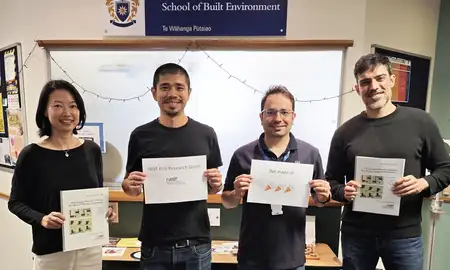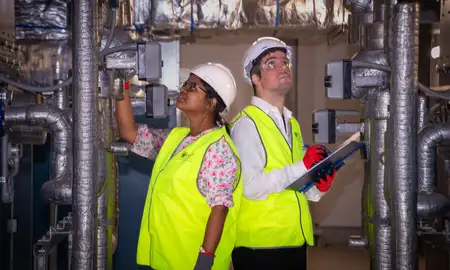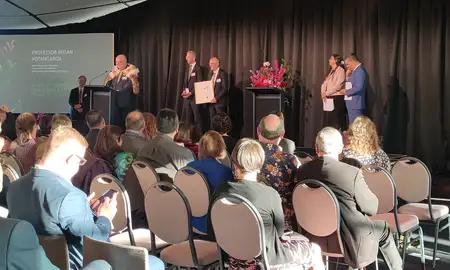
PhD student Widi Auliagisni after receiving her award. Photo credit Luke Jackson.
Widi Auliagisni is the sixth young leader to be awarded the title and says it’s humbling and inspiring to be recognised in this way.
“Being named the Future Thinker of the Year is not just an honour for me, but it's also a platform to encourage other students and young professionals to fearlessly share their ideas. Each of us has unique perspectives and insights that can contribute to a better future. I hope this recognition serves as a reminder that no idea is too small or too unconventional and that by sharing our ideas, we can collectively drive positive change.”
The annual award, given by the New Zealand Green Building Council, acknowledges a student or young professional who demonstrates environmental knowledge and leadership and recognises their success and passion for greener, better buildings and communities.
The School of Built Environment doctoral student was recognised for her research that focuses on community resilience to natural hazards and sustainability, particularly in the Northland region. As part of this research, she has been working closely with at-risk communities to enhance flood resilience.
Widi says the inspiration for pursuing this research stemmed from a combination of curiosity and a desire to address a pressing issue.
“I felt drawn to the overlooked challenge of flood management and community resilience after reading about the 2020 floods caused by record rainfall. My curiosity led me to question why floods recur and persist as a significant problem, despite the abundance of green space here in Aotearoa.
“My research has illuminated the devastating impact of recurring floods on communities, prompting an urgent call to halt construction in floodplains. I have witnessed firsthand the resilience of communities facing adversity, and advocate for collective action to build resilience from the ground up. This includes re-evaluating building practices and fostering dialogue on the importance of protecting our floodplains.”
She says the support from her supervisors, colleagues, local councils, librarians and communities in Northland have been instrumental in shaping her research journey.
“Their willingness to share stories and insights have not only enriched my work, but inspired me to give back, not just to people but also to nature, by working on finding more sustainable solutions to this ongoing challenge and contribute to a stronger, more resilient Aotearoa.”
Having grown up in Indonesia, a country prone to natural hazards, Widi developed a passion for resilient architecture and disaster management that influenced her academic journey.
Prior to enrolling in doctoral studies, she completed a Bachelor of Science in architecture from Institut Teknologi Bandung, Indonesia and a Master of Construction from Te Kunenga ki Pūrehuroa Massey University.
As an international student working with local communities for her PhD research, Widi was initially worried about being seen as an outsider.
“However, I’ve found that by connecting with the community on a personal level and approaching them with humility and a genuine desire to collaborate, I’ve been able to build trust and meaningful relationships. Their warmth and openness have been truly inspiring. They’ve welcomed me into their community meetings and invited me to their homes and farms, which has deepened my understanding of their experiences and reinforced the interconnectedness of humanity.
“It’s reminded me of the proverb ‘Hei aha te mea nui o te au, he Tangata, he Tangata, he Tangata’ [What is the most important thing in the world? It is people, it is people, it is people], emphasising the importance of people above all else,” she says.
Once Widi has completed her PhD, she hopes to apply the insights and knowledge to real-world solutions for flood management and community resilience.
“I’m excited to collaborate with stakeholders and policymakers in the future to implement sustainable strategies that benefit both people and the environment. Ultimately, my goal is to make a positive impact and contribute to creating a safer and more resilient future for communities facing flood risks.
“I’m eager to do more in terms of sharing and encouraging fellow researchers and practitioners to adopt a community-based approach from the outset. I firmly believe that involving communities in the decision-making process is crucial for creating plans and policies that truly serve their needs.”
Read more about Widi’s win here.
Related news
Funding secured for project aiming to boost wildfire resilience through gaming
A team from the School of Built Environment has secured $US100,000 in funding from the National Institute of Standards and Technology (NIST) for a project that aims to develop an educational gaming solution, based on insights from previous wildfire disasters, to enhance community preparedness.

Building success with launch of new cutting-edge construction qualification
A new Bachelor of Construction (Honours) offering from the School of Built Environment will see students elevate their career by holding an internationally recognised post-degree qualification.

Professor Regan Potangaroa recognised for a career committed to people
Professor Regan Potangaroa, Ngāti Kahungunu ki Wairarapa, has been awarded the Te Rangaunua Hiranga Māori Award by the Royal Society Te Apārangi.
